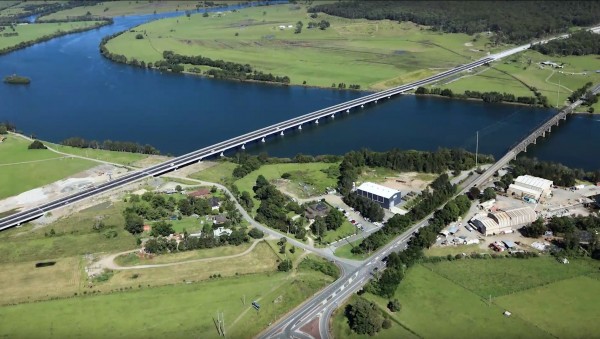
Environment and safety
Transport for NSW are committed to a safe and sustainable transport system for the whole state. This means that all transport infrastructure plans, design, construction, operations, maintenance and management will take into account economic, environmental, health, community and social factors at all times.
To achieve this we partner with other organisations, groups and businesses that are committed to the same environmental and safety outcomes.
Working collaboratively also helps us to ensure that goods carried via freight by road, rail and at ports can reach their markets safely, efficiently and with minimal impact on people and environments.
Image

Image controls:
Our Environment and Safety initiatives
Transport for NSW
Transport for NSW aims to achieve good transport outcomes that support the projected growth of the NSW economy through.
- Energy and resource management: we are efficient in our energy use, reduce our greenhouse gas emissions and use less water
- Pollution control: we keep air, noise and water pollution to a minimum
- Climate change resilience: we build and operate to withstand the effects of climate change
- Minimise impacts: we minimise transport impacts on biodiversity and heritage
- Liveable communities: we aim to sensitively integrate transport infrastructure and movement with the way people live and work on the land
- Corporate sustainability: we are resource efficient in all our day to day functions
All of our projects must have an approved Environment Protection Licence (EPL).This is held either by TfNSW, the appointed construction contractor or delivery partner.
Environmental sustainability
Learn more about the walking, cycling and public transport options to lower environmental impacts.
Freight
Freight is a critical component of the NSW economy. It is worth nearly $66 billion a year to the NSW economy. The economic growth and prosperity of NSW depends on the safe, sustainable and productive movement of goods.
The NSW Freight and Ports Plan 2018-2023 is a call to action for government and industry to collaborate to make the NSW freight task more efficient and safe so NSW can continue to move and grow.
Rail freight noise
Rail freight noise can impact on communities who live close to rail infrastructure.
The Freight Noise Attenuation Program is one active way we help to reduce the impacts of rail freight noise. It offers free or discounted noise reduction treatments for homes affected by high levels of freight rail noise along NSW Government managed rail routes between Sydney and Nowra, Macarthur,Newcastle, and Lithgow.
This means we can keep the vital flow of everyday goods for households and businesses moving in NSW.
Safety
Our goal is to reduce transport safety incidents, and their impacts on people and property.
Road safety
The Centre for Road Safety develops practical solutions to reduce deaths and serious injuries on NSW roads. The way we develop and target our road safety campaigns, work with the community and design our roads and vehicles can greatly affect the outcome of road crashes in NSW.
The Road Safety Plan 2021 will position NSW to achieve the longer term target of a zero road toll to support the Future Transport strategy, a 40-year vision for transport in NSW to meet the changing needs of customers.
Maritime safety
The Centre for Maritime Safety is responsible for evidence-based strategy, policy, and awareness campaigns, and key stakeholder relations for the Government’s maritime program.
Road freight safety
Transport for NSW works with the freight and heavy vehicle industry and other government agencies to improve road safety outcomes for all road users.
Find out more here: Heavy vehicle road safety
Rail freight safety
At Transport for NSW we work closely with the Office of the National Rail Safety Regulator (ONRSR) to implement rail freight safety reforms.
We also partner with the National Transport Commission to maintain rail safety national law in rail freight operations.
Ports and maritime freight safety
We maintain high standards of marine safety at all trading ports and coastal waters in NSW.
We administer the Port Safety Operating Licence (PSOL) issued by the Minister for Transport to the Port Authority of New South Wales under the Ports and Maritime Administration Act 1995.
The Port Safety Operating Licence (PSOL) covers port safety activity at designated ports in NSW. These include the ports of Eden, Port Kembla, Port Botany, Sydney Harbour, Newcastle and Yamba.
We undertake safety checks of trading ships and cruise vessels that enter smaller ports not covered by the Port Authority. Safety of smaller commercial and recreational vessel operations are managed by the Centre for Maritime and Transport Safety and NSW Maritime.
We manage port safety for the handling and movement of dangerous goods in smaller ports not covered by Port Authority.
We also use the NSW Marine Pilotage Code to ensure high standards of health, training and safety for NSW marine pilots, Marine Pilotage Exemption Certificates and Certificates of Local Knowledge.
Sydney Trains & NSW Trains
- Sydney Trains environment and sustainability
Sydney Trains is committed to long-term, proactive management of its environmental risks. - NSW Trains and the environment
At NSW Trains we are working to develop and implement initiatives across the network that will benefit the environment.
For more information
Contact us:
Online at Transport for NSW
